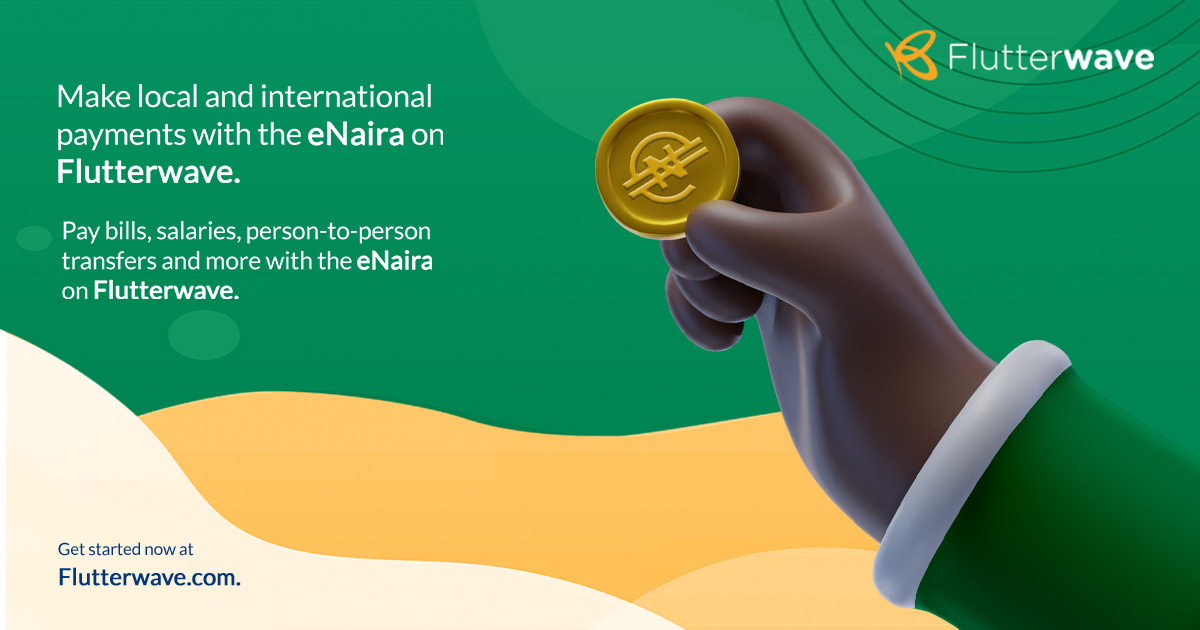The Central Bank of Nigeria has recently launched the eNaira, a digital representation of the physical Naira. We have compiled some frequently asked questions and answers on ways Flutterwave helps people access and transact with the eNaira.
What is e-Naira and how does it work?
E-Naira is a digital currency to be issued by the Nigerian government with the same value as fiat naira (i.e. physical naira notes). It is to be purchased by the general public through Financial Institutions (FIs) and transferred into e-wallets maintained by customers. It is similar to the Chinese digital renminbi and the Swedish e-krona
How is the Central Bank Digital Currency (CBDC) different from cryptocurrency?
Cryptocurrencies are decentralized, CBDCs are centralized; while cryptocurrencies offer anonymity, CBDCs would allow the CBN to know exactly who holds what. A CBDC would not be pegged to a fiat currency; it would be the fiat currency. A CBDC version of a Naira would be the same as a Naira bill. That is, 1 CBDC = 1 Naira.
What can I use e-Naira for?*
- Salary payments
- Shopping
- Payment of good and services etc
*These are possible with partners and merchants who have the E-Naira payment option.
What can I do with e-Naira through Flutterwave?
- Customers can link their e-Naira to Barter
- Merchant can link their e-Naira to Flutterwave for Business
- Customer can view their e-Naira balance
- Merchant can view their e-Naira balance
- Customer can fund their e-Naira directly from their Barter balance
- Merchant can fund their e-Naira directly from their F4B balance
- Customer can withdraw from their e-Naira to Barter
- Merchant can withdraw from their e-Naira to their other F4B balances
- Customer can view transactions done on their e-Naira balance
- Merchants can view transactions done on their e-Naira balance
- Customers can payout (local transfers, P2P, International) from their e-Naira balance if they have insufficient funds in their Naira balance
- Merchants can payout (local transfers, P2P, International) from their e-Naira balance if they have insufficient funds in their Naira balance
- Send money to another e-Naira account home and abroad
How long will it take for a beneficiary to receive funds?
Local beneficiaries would receive their funds instantly.
How can I pay for physical goods with the eNaira?
You can pay with your e-Naira by choosing the pay with E-Naira option on the Flutterwave checkout page or other merchants and institutions that have the E-Naira payment option.
How can you get E-Naira?
The e-Naira CBDC lifecycle involves a 4-step process to full implementation and adoption of which the second stage ends with you having a portion to transact with;
- Issue CBDC; The apex bank would design, create and store CBDC.
- Distribution of CBDC; CBN distributes CBDC to financial institutions and licensed service providers (including Flutterwave). After which financial institutions and licensed service providers provide CBDC to individuals and businesses.
- Transaction with CBDC; The transaction can either be offline or online. An online transaction can be made when individuals and businesses transfer value in real-time via existing and future payment channels. Also, individuals can transfer value in real-time while offline to other individuals and businesses.
- Monitor and Maintain CBDC; CBN can reconcile issued CBDC. Also, CBN can withdraw and issue new CBDC with modernized technical and security attributes.
What do I need to sign-up?
The minimum requirement is a National Identification Number and a passport photo. Biometric Verification Number (BVN) and other forms of KYC documents may be required.
The E-Naira wallets are in three tiers. The first tier can be used by people without bank accounts, however, they’ll be required to provide their National Identity Number (NIN), a passport photograph, name, date of birth, phone number and home address. The wallet also has a daily transfer limit of ₦50,000.
Users of the second tier wallet are required to own bank accounts and have a Bank Verification Number (BVN). The daily transaction limit is ₦200,000.
The third tier wallet also requires at least a BVN. The transfer limit for the tier is ₦1,000,000.
How do I sign up?
To use the e-Naira to transact,
- Users will have to download the speed wallet
- Validate their account on the wallet by using either their phone number, National Identity Number (NIN) or Bank Verification Number (BVN)
- Once done, users can begin to use the wallet
Users will be able to send money using Peer-to-Peer (P2P) transactions through their wallets to other wallet holders, Person-to-Merchant/Business where e-Naira users can pay for items to merchants who have the e-Naira wallet and vice versa.
